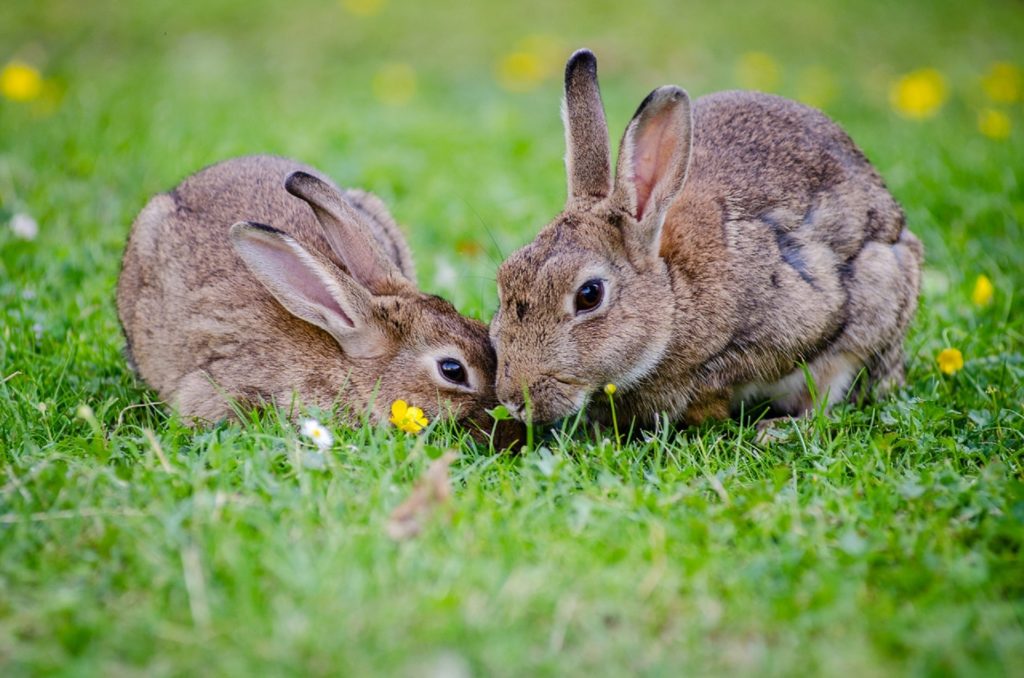Reducing Rabbit Damage

This week someone asked me what plants would keep rabbits out of their vegetable garden. I told them if they find the magic plant, let me know. Rabbits can be really troublesome to gardeners in our area, and people frequently ask us about them. Unfortunately, there are no easy answers, but here are some tips that may help.
- The best way to keep rabbits out is to make a fence around your garden. The fence should be 3 feet tall, and because rabbits dig, it should extend underground another 2-6 inches. Chicken or wire mesh is a great, inexpensive material to use, but be sure the holes in your wire are no larger than one inch. Believe it or not, a small but determined rabbit can go through just about any hole larger than that.
- Clean up your yard. Remove brush piles and tall grasses that provide a habitat for them. Also keep the area beneath any birdfeeders clean. Rabbits (and voles and other pests) are attracted to the easy food source.
- Use wire or cloth wraps to protect the trunks of young trees.
- Metallic pinwheels, aluminum foil strips tied to a string, owl statues, and rubber snakes can scare rabbits away. The key it to make sure you move them around your garden frequently. If something is always in the same place, they will get used to it. Motion activated sprinklers are another option.
- Try a deterrent like Liquid Fence, Rabbit Scram, Repels All, or others. There are many liquid or granular options available at any hardware store or online. If you use these, read the label carefully. Check to see if they are safe for pets and small children, and that they are food safe if you intend to use them on vegetables or fruits. And remember to use them only as instructed. Most likely these will need to be reapplied regularly, especially after it rains. There are also many home remedies, like sprinkling ground hot pepper, dried blood, or soap shavings in your garden. Just do an online search for “rabbit repellent recipe.”
- Live trap them and release them several miles from your home. Be sure to have the permission of the property owner or manager wherever you let them go. If you like outside a city or town, you can legally shoot rabbits in Wisconsin. Poison should not be used because they are very unsafe for humans, pets, and wildlife. In fact, it is illegal.
- Plant stuff rabbits don’t like to eat. A very hungry rabbit will eat whatever is available, but they do have their likes and dislikes, just like us. Pleasant Prairie Greenhouse carries the following “rabbit resistant” plants:
- Vegetables: cucumber, leeks, onions, potatoes, squash, tomatoes, and zucchini.
- Herbs: basil, lavender, mint, oregano, sage, and thyme.
- Annuals: alyssum, angelonia, dahlia, geranium, lantana, marigold, snapdragons, strawflower, vinca, and zinnia.
- Perennials: artemisia, astilbe, bee balm, black eyed Susan, daylilies, delphinium, ferns, foxgloves, iris, lamb’s ear, lamium, lavender, nepeta, poppies, salvia, sedum, & yarrow.
- Trees and Shrubs: dogwood, hawthorn, hydrangea, juniper, lilac, magnolia, oak, rhododendron, spirea, and viburnum.
As I said before, there are no guarantees that any of these methods will work, but with persistence, you can greatly reduce the rabbit damage to your flowers, trees, and vegetable garden.
